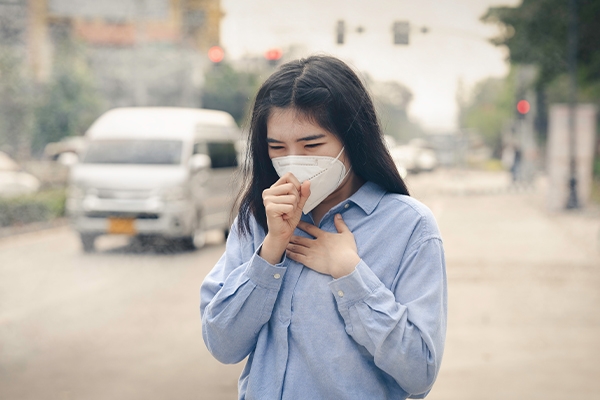Why Can Anyone Get Asthma?

Asthma can affect anyone at any age. Asthma is affected by a variety of factors, including genetics, allergies, and pollution. Although there is no complete cure for asthma, long-term management measures can effectively control the condition.
According to WHO data from 2019, asthma affects 262 million people worldwide and is responsible for 455,000 deaths. The majority of fatalities occur in low- and lower-middle-income countries due to a lack of access to medical care and accurate diagnosis.
What about Indonesia? According to Ministry of Health data for 2020, asthma is one of the most common diseases in Indonesian society. Asthma affected 4.5% of Indonesia's total population, or more than 12 million people, until the end of 2020.
Asthma is a recurring chronic disease that can occur at any time. It's not a communicable disease. Asthma is characterized by inflammation and narrowing of the small airways in the lungs, resulting in shortness of breath.
What was the cause?

Asthma affects both children and adults. The causes are thought to be obesity, excessive stress, a poor lifestyle, and an unhealthy environment.
The triggers are distinct. According to some, this condition is caused by genetic and environmental factors. Allergies, air pollution, and other airborne irritants are the most common asthma triggers. Other health conditions, such as respiratory infections, exercise or physical activity, weather and air temperature, strong emotions, and some drugs, all have an impact on asthma.
Asthmatics should avoid chemical fumes, cigarette smoke, and air pollution to prevent recurrence. Avoid sports and physical activity as well when the weather is cold.
Some people develop asthma as a result of allergens (allergy-triggering substances) such as animal dander, mites, dust, and pollen. Several other people develop asthma as a result of consuming addictive substances such as jam, shrimp, processed food, ready-to-eat food, packaged fruit juice, beer, and wine. Food allergies, such as those to shrimp and nuts, can also cause asthma.
Take precautions. Prolonged stress without effective stress management skills increases the possibility of recurrence.
Asthmatics should also take caution when taking medication. For example, drugs, particularly nonsteroidal anti-inflammatory pain relievers and beta-blocker drugs—a class of drugs used to treat hypertension and other heart conditions.
How are the symptoms?

Asthma symptoms vary and are different for everyone. Some people experience symptoms when doing activities, such as sports. Some others have symptoms all the time.
The general symptoms of asthma resemble those of other diseases, namely coughing, wheezing, shortness of breath, and chest pain. However, some of the following can be indicators of asthma:
- Symptoms are worse in the morning or at night.
- The symptoms disappear on the same day.
- It appears or worsens when the patient is infected with a virus, such as a cold.
- It arises during sports, allergies, cold air, or intense and excessive emotional changes during times such as stress, excessive laughing, or crying.
Is it preventable and treatable?

Asthma could not be cured until recently. Only with proper control and treatment can people with asthma engage in normal activities and live a long life. Typically, sufferers use inhalers to control their symptoms. They can then resume their normal, active activities.
There are two kinds of inhalers:
- Bronchodilators (such as salbutamol). Open the airways and relieve symptoms.
- Steroids (such as budesonide and beclomethasone). Reduce airway inflammation. It alleviates asthma symptoms and lowers the risk of severe asthma attacks and death.
Does changing your diet help your symptoms?

There is no asthma diet to alleviate symptoms. However, the following suggestions may be useful:
- Avoid stress and get plenty of rest. Avoid staying up late.
- Plan a healthy diet. Consuming more fruits and vegetables helps to reduce lung inflammation and allergy triggers. Antioxidants found in vegetables and fruits include beta-carotene and vitamins C and E.
- Avoid allergen-inducing foods and beverages.
- Play sports. Choose sports that are easy on your lungs, such as yoga, swimming, walking, pilates, and Tai Chi.
- Avoid exercising in cold weather.
- Cleaning up the house every day. Cleaning the house can help remove allergens that are in the air and on the surfaces of household furniture. Wear a mask and gloves.
- Quit or don't smoke. Avoid cigarette smoke and air pollution. Smoking irritates the respiratory tract. This irritation causes inflammation, which triggers asthma attacks. Quitting smoking also protects the lungs from a variety of diseases.
- Meet vitamin D requirements. Consumption of foods such as eggs, fish, and milk, as well as sunbathing, can help prevent the onset of asthma symptoms.
- Maintain a healthy body weight. Asthma is triggered by being overweight. Learn the proper diet to maintain a healthier body condition in the long run.
Asthma is a minor annoyance for some people. For others, it can become a major issue that disrupts daily activities. Even severe asthma attacks can be fatal.
It is critical that you see a doctor. This is useful for monitoring symptoms and adjusting treatment.
If you have any questions about asthma, click on WhatsApp or visit the nearest GWS Medika Clinic.



